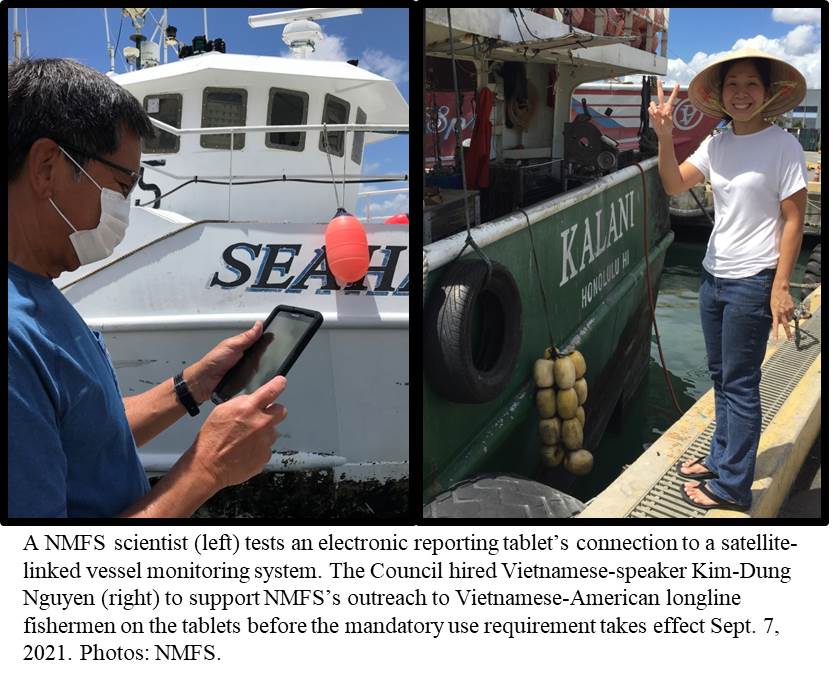News and Announcements
Press Release – Modernizing Catch Reporting in Hawaii and American Samoa Longline Fisheries ( 10 August 2021)
 HONOLULU (10 August 2021) The National Marine Fisheries Service (NMFS) announced last week that the requirement for the Hawai‘i and American Samoa pelagic longline fisheries to electronically report their catch will be effective Sept. 7, 2021. This regulation is intended to reduce human error, improve data accuracy, save time for fishermen and NMFS, and provide more rigorous monitoring and forecasting of catch limits.
HONOLULU (10 August 2021) The National Marine Fisheries Service (NMFS) announced last week that the requirement for the Hawai‘i and American Samoa pelagic longline fisheries to electronically report their catch will be effective Sept. 7, 2021. This regulation is intended to reduce human error, improve data accuracy, save time for fishermen and NMFS, and provide more rigorous monitoring and forecasting of catch limits.
Development of the electronic reporting (ER) system for the Hawai‘i and American Samoa longline fisheries ramped up about 2014. After several years of development, the Pacific Islands Fisheries Science Center (PIFSC) began rolling out the tablets in 2019 for Hawai‘i longline vessels to use on a voluntary basis. At its September 2020 meeting, the Western Pacific Regional Fishery Management Council took final action recommending mandatory implementation.
To support PIFSC’s ER outreach to Vietnamese-American fishermen, the Council hired a Vietnamese-speaking staff. The outreach team introduces the tablet, conducts training and follows up with them after their initial trips to help resolve any issues.
Approximately 115 of the 150 Hawai‘i longline vessels have been trained and are now voluntarily using the tablets ahead of mandatory implementation. PIFSC is also coordinating with local NMFS staff in American Samoa to roll out training for the longline vessels based in Pago Pago. PIFSC will continue to provide training support to bring all vessels into compliance.
After Sept. 7, 2021, Hawai‘i longline vessels and Class C and D American Samoa longline vessels will be required to use electronic logbooks once the following criteria are met:
- NMFS notifies the permit holder of the requirement.
- Permit holders have received the ER tablet (at no cost).
- The vessel operator has obtained an individually assigned user account from NMFS.
Fishermen will be allowed to use paper logbooks as a backup if vessels experience any electronic logbook or transmission problems.
In the past, longline captains filled out one logbook sheet for every day of fishing during their trip. Then they submitted their full trip’s log sheets to the Pacific Islands Fisheries Science Center (PIFSC) when they returned to port. The data were verified and manually entered into a database by PIFSC staff.
There was often a several week delay between when the paper logbook was filled out by the captain and when it became available to fishery managers to compare the latest catch information with catch quotas. The delay creates a significant challenge to predict when the fleet will reach annual catch limits, such as for bigeye tuna.
Electronic logbooks automate and streamline many of these steps, allowing near-real-time catch reports. Each vessel is equipped with a tablet loaded with ER software. The tablet is connected to a vessel monitoring system, which transmits the daily logbook data via satellite to NMFS. Daily catch data submission will be required under the new rule while operating in U.S. waters around Hawai‘i, American Samoa and adjacent high seas.
The Federal Register notice is available at: www.wpcouncil.org/fr-notice-electronic-logbooks-for-hawaii-and-american-samoa-pelagic-longline-fisheries-august-5-2021.
Western Pacific Regional Fishery Management Council: Secretary of Commerce appointees from nominees selected by American Samoa, CNMI, Guam and Hawai‘i governors: Michael Dueñas, Guam Fishermen’s Cooperative Association (Guam) (vice chair); Howard Dunham, commercial fisherman (American Samoa) (vice chair); John Gourley, Micronesian Environmental Services (CNMI) (vice chair); Edwin Watamura, Waialua Boat Club (Hawai‘i) (vice chair); Monique Amani, business owner (Guam); Roger Dang, Fresh Island Fish Co. (Hawai‘i); and McGrew Rice, charter boat captain (CNMI). Designated state officials: Anthony Benavente, CNMI Dept. of Lands and Natural Resources; Suzanne Case, Hawai‘i Dept. of Land & Natural Resources; Chelsa Muña-Brecht, Guam Dept. of Agriculture; and Archie Soliai, American Samoa Dept. of Marine & Wildlife Resources (chair). Designated federal officials (voting): Michael Tosatto, NMFS Pacific Islands Regional Office. Designated federal officials (nonvoting): David Hogan, U.S. Dept. of State; Brian Peck, U.S. Fish and Wildlife Service; and RADM Matthew Sibley, USCG 14th District.
